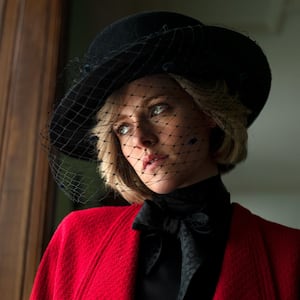There is no actress alive today who can hold a close-up like Kristen Stewart. As the camera homes in, you feel her defenses intensify; it feels, more than anything, like a violation. And it’s why she’s perfectly suited for the role of Princess Diana, the tortured royal felled by a voyeuristic tabloid press.
When we first encounter her Diana in Spencer, which a title card bills as “a fable from a true tragedy,” she is speeding in her Porsche convertible—top down, blonde bob dancing in the wind—down the backroads of Norfolk, England. She is oh so terribly late for Christmas Eve dinner at Sandringham, the Queen’s royal estate. If there were any doubts as to the absurd level of ceremony on display, her joy ride is cross-cut with lines of British soldiers hauling military crates into a vast kitchen, opening them to reveal an array of exotic fruits and lobster. Diana pulls over to the side of the dirt road, exits the vehicle, and asks, “Where the f-ck am I?”
The year is 1990, and she’s already spent nine long years tethered to an incurious and aloof husband (Prince Charles) with eyes for another. Diana is only 29, but a shadow of her former self, having been stripped of any and all agency. Her schedule is arranged, her outfits are chosen, and her every movement is monitored by The Firm. “It’s as if everything has already happened,” she says. Due to all the press attention she’s received, the Queen has tightened the reins ever more, ordering her equerry (Timothy Spall), a former soldier, to keep a watchful eye on her. One of the only areas she can still control, at least somewhat, is her body, so she’s taken to binging and purging food—and cutting herself. The sheer weight has become so unbearable that she is often struck by suicidal ideation, staring at a set of stairs and wishing she could throw her body down them.
Diana’s only solace lies in her young children, William and Harry, who she’s fiercely protective of, and Maggie (Sally Hawkins), a royal servant and her only true sounding board. One of the smarter moves Spencer makes is pushing Charles to the background, thereby keeping the focus squarely on Diana’s torment. Like Jackie, filmmaker Pablo Larraín’s prior exploration of a wounded bird in a gilded cage, his Diana is captured via a mixture of wide, close-up, and tracking shots in order to drive home her overwhelming sense of alienation and claustrophobia. It’s almost a mixture of Jackie and Stewart’s Personal Shopper, positioning Diana’s tale as a gothic horror story of a woman lost to madness in a cold, haunted mansion (in the film’s campiest moments, she is even visited by the ghost of Anne Boleyn, another woman crushed by the crown’s machinery, who urges her to break free from her bondage). Meanwhile, Johnny Greenwood’s crescendoing score, oscillating between jazz drums, plaintive piano, and strident strings, ups the anxiety quotient considerably.
But Spencer is, first and foremost, a showcase for Stewart’s talents, and the actress—who knows a thing or two about tabloid persecution—is more than up to the task of tackling this near-mythic figure. She nails Diana’s breathy voice and affect; her slouched posture; and her inner anguish. There is a musicality to her performance, too; a staccato rhythm set to Larraín’s perpetually-in-motion camera. Over the course of three days—Christmas Eve to Boxing Day—she presents the full breadth of Diana’s doomed quest for autonomy, and compassion.
Few actors convey vulnerability quite like Stewart, whose every inch trembles with each judgmental glance or ugly jibe. Up until now, and despite a bevy of deserving performances—from Into the Wild and Adventureland to her collaborations with Olivier Assayas—Oscar has cruelly shunned Stewart. Perhaps we can chalk it up to the reputation-sullying Twilight Saga, whose poor writing and direction, at times, left her rudderless. But it won’t any longer.







